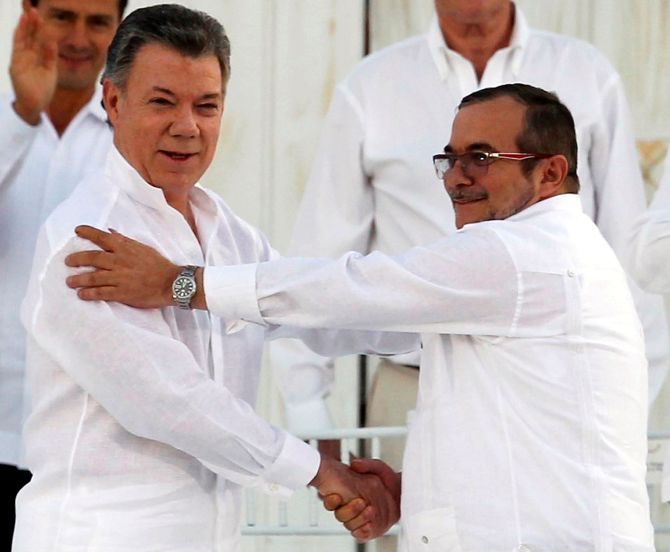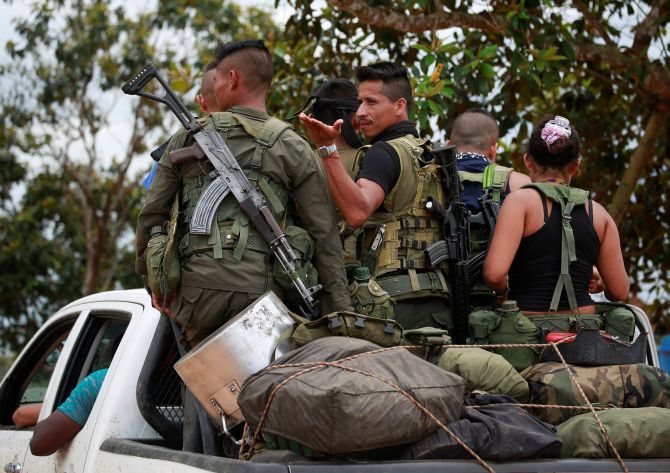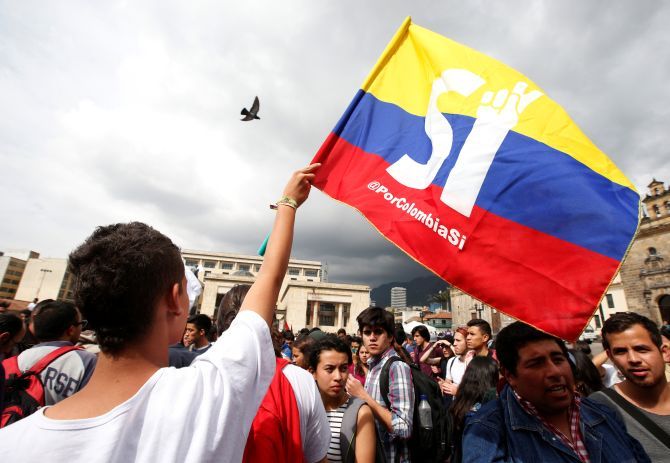On Friday, Colombian President Juan Manuel Santos won the Nobel Peace Prize for “his resolute efforts to bring the country’s more than 50-year-long civil war to an end, a war that has cost the lives of at least 220,000 Colombians and displaced close to six million people”.
The Nobel committee said that despite the peace deal with the Revolutionary Armed Forces of Colombia, the result of four years of negotiations, was narrowly rejected in a referendum in the country last Sunday, it showed that Colombians had not given up on peace.
For those who don’t know who the Revolutionary Armed Forces of Colombia are or what’s happening in Colombia, here’s a simple explainer.

Who is the FARC?
The FARC is the Fuerzas Armadas Revolucionarias de Colombia (the Revolutionary Armed Forces of Colombia). It’s a Marxist rebel group that since 1964 has waged a bloody rebellion against the Colombian government -- and it’s the longest-running armed insurgency in the Western Hemisphere.
Why was the FARC formed?
In the early 1960s, FARC was formed as a rural insurgency that claimed to represent the interests of Colombia’s poor against the landed elite. In those days, the Colombian state sold off large tracts of land to private owners in the late 19th and early 20th centuries to pay its debts. Reacting to their land being sold, the FARC demanded more rights and control over the land.
But their Communist ideals were seen as a threat by big landowners and the State, which sent in the army to disband the commune, or Marquetalia Republic as it had come to be known and subsequently this led to FARC taking up arms.

How violent is FARC?
The FARC has been responsible for horrific acts of violence throughout its five decades of existence.
Operating mostly in the rural corners of the country, FARC guerrillas have long terrorised citizens with murders, kidnappings and the constant threat of extortion.
Members of the FARC assassinated a Colombian culture minister in 2001, hijacked a domestic flight carrying a senator in 2002 and is estimated to have kidnapped more than 25,000 people from 1970 to 2010, according to a report from the Colombian Council on Foreign Relations.
What is this peace deal that Colombia signed with FARC?
Over the years, the FARC have been hit hard by Colombian security forces. In the past decade, many of the top leaders of FARC were killed or died.
Following the deaths, in 2010, the FARC started formal negotiations with the government to bring about peace in the country. According to the peace deal, the FARC’s fighters would give up their weapons to United Nations inspectors, and become a legal political party with 10 guaranteed seats in the country’s Congress in the 2018 and 2022 elections. The deal would also allow rebels to avoid jail time if they confessed to their crimes.
After many deliberations, the head of the FARC Timoleon Jimenez, aka Timochenko, signed the deal with Colombian President Juan Manuel Santos.

Why did voters reject it?
So, wait, a peace deal was struck and voters rejected the referendum. Well, yeah. Last Sunday, Colombians rejected the peace deal to end 52 years of war with FARC guerrillas. The public’s main objection to the agreement was that it was far too lenient on FARC fighters, whose war against the Colombian government has ravaged the country for more than half a century.
What happens now?
The peace agreement as written cannot be implemented without an approval by referendum, so it will have to be renegotiated. Colombian President Santos has promised to “continue the search for peace until the last moment of my mandate, because that's the way to leave a better country to our children ... I won’t give up,” he said.
So, despite the peace deal being rejected, why did the Nobel committee award Santos with the prize?
The Norwegian Nobel Committee said that the aim was to encourage peace efforts in the war-torn country, which are now in "real danger" of collapse.
"We hope that it will encourage all good initiatives and all the parties who could make a difference in the peace process and give Colombia -- finally -- a peace after decades of war," said committee chairwoman Kaci Kullmann Five.
The committee said the award was also "a tribute to the Colombian people" who had not given up hope of a just peace as well as to the families of the "countless victims" of the war.










